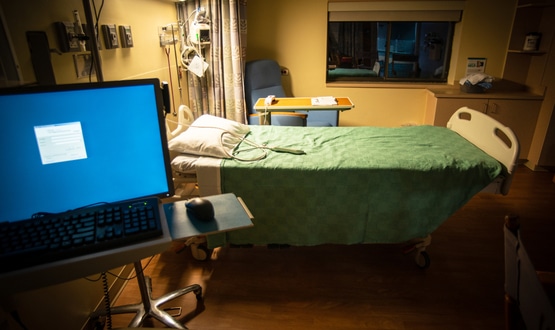St George’s begins roll out of Siilo messaging app following successful pilot
- 11 September 2019

St George’s University Hospital NHS Foundation Trust has begun the roll out of a WhatsApp-style clinical messaging service on one of its wards following a successful pilot.
Siilo was trialled on the orthopaedic department in early 2018 and is now used by clinicians, junior doctors, specialist physician associates and specialist nurses across the ward. The trust is now now encouraging other departments to begin using the app.
The app provides staff with a safe, secure and speedy way of sharing patient data.
Darren Lui, spinal and orthopaedic surgeon at St George’s Hospital, who led the roll-out of the app, said: “As a level one trauma centre, the department treats a large number of patients and communication is essential to ensure everything runs smoothly – we were keen not to disrupt this and so we wanted to find a solution that delivered the balance between convenience, practicality and compliance.
“Before we introduced Siilo, we often had to communicate in abstract ways – using imprecise language or doctored images to avoid breaching patient confidentiality.
“But now, safe in the knowledge that patient information can no longer be accessed by external sources, communication between staff members is much more precise – it has absolutely transformed the way teams communicate.”
Siilo is currently used by more than 150,00 healthcare professionals across Europe.
The need for secured clinical messaging apps was evident after the 2017 WannaCry attack, when WhatsApp became a key communication tool after NHS staff were locked out of their computer systems.
NHS Digital issued guidance on the use of instant messaging apps in the wake of WannaCry, which sets out how, and in which circumstances, doctors, nurses and other healthcare staff can use messaging apps within acute care settings.
It also outlined privacy rules and procedures for sharing patient information.
The guidance does not endorse any particular app, but sets out what standards need to be met by health staff using instant messaging during emergencies to co-ordinate patient care.
This includes only using apps and other messaging tools that meet the NHS encryption standard, keeping clinical records separate and deleting any notes after they have transcribed and attributed in the medical record.
But some have called the guidance “more confusing than helpful”.
READ MORE
- Jeremy Hunt backs calls for ‘WhatsApp-style’ messaging app for NHS staff
- NHS issues guidance on use of instant messaging apps
- Instant message app guidance ‘more confusing than helpful’, doctor says
- UH Bristol pushes ‘WhatsApp-style’ care co-ordination app to 1,000 clinicians
- WhatsApp doc: Legal and practical perspectives of using mobile messaging




